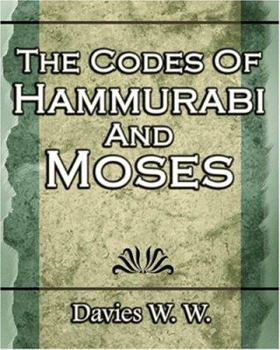The Codes Of Hammurabi And Moses
Select Format
Select Condition 
Book Overview
This work has been selected by scholars as being culturally important, and is part of the knowledge base of civilization as we know it.This work is in the "public domain in the United States of... This description may be from another edition of this product.
Format:Paperback
Language:English
ISBN:1594623384
ISBN13:9781594623387
Release Date:August 2006
Publisher:Book Jungle
Length:132 Pages
Weight:0.74 lbs.
Dimensions:0.3" x 7.6" x 9.3"
Customer Reviews
4 ratings
Useful Old Text
Published by Thriftbooks.com User , 19 years ago
Although over 100 years old, this publication is a useful edition of the Hammurabi Code. This edition may be of special interest to religious readers because it cross-references the texts of Hammurabi and Moses.
Expanded my parameters of Old Testament Lore.
Published by Thriftbooks.com User , 20 years ago
The Hammurabi's Code is one of the earliest sets of laws found, and one of the best preserved examples of this type of document from ancient Mesopotamia. It shows rules and punishments if those rules are broken. It focuses on theft, farming (or shepherding), property damage, women's rights, marriage rights, children's rights, slave rights, murder, death, and injury. The punishment is different for different classes of offenders and victims. The laws do not accept excuses or explanations for mistakes or fault: the Code was openly displayed for all to see, so no man could plead ignorance of the law as an excuse. Few people, however, could read in that era (literacy mainly being the domain of scribes). Davies brings the code to light for readers interested in how the law reflects what was eventually to become the old testament. Fascinating reading for any student of religion and antiquity.
Early Origins of Western Law
Published by Thriftbooks.com User , 20 years ago
One of the most important documents that has affected western civilization's laws.
An eye for an eye, a tooth for a tooth
Published by Thriftbooks.com User , 21 years ago
A number of Mesopotamian achievements that form the basis of Western civilization include writing, astronomy, literature, and agriculture. Another innovation that needs to be included in this list is the creation of law codes. The Code of Hammurabi is certainly not the oldest law code to have been written, but it is the most complete to have been found. As such, this has allowed us to fully explore the influence that this document and others like it had on the development of the Torah. In this book that was originally published in 1905, W.W. Davies attempts to defend the possibility that a law code as "perfect" as the Law of Moses could have been written as early as the second millenium B.C. by providing another lawcode that was just as developed and sophisticated, but written even earlier in the third millenium B.C. Note that it is now generally agreed that Hammurabi's Code was written in the early part of the second millenium B.C. In any event, Davies defends his claim in this book by looking for parallels between the law codes of Hammurabi and Moses. The translation presented in this book is based on the stele preserved in the Louvre in Paris. The code consists of 282 laws, 34 of which (Nos. 66-99) have been lost. Although this translation was made before 1905, it is my understanding that the lost laws remain undiscovered up to today. Therefore, in terms of structural integrity, the translation presented here should still be accurate. I got the impression that Hammurabi's code was similar to a "frequently encountered disputes" list, which local judges could refer to in order to adjudicate common cases. Therefore, Hammurabi's code is not meant to provide a verdict on every possible dispute under the sun (that would be futile), but to provide a standard procedure for common cases. By reading the law code of Hammurabi, it's possible to gain a flavor of some of the contemporary problems faced by the Babylonians in the early second millenium B.C. A lot of the laws deal with contract disputes, property disputes, the rights of women, and guidelines for professional practice. After reviewing the type of problems that the Babylonians had to face, it really becomes apparent that the Mesopotamian civilization achieved a level of sophistication that was absolutely unrivalled in their day.





